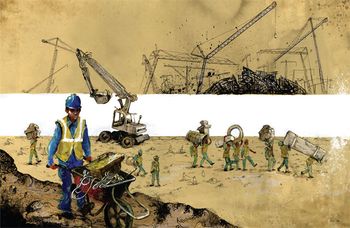Molly Crabapple in Vice:
 Though it is now only a sunbaked construction site, Saadiyat, a ten-square-mile atoll 500 yards off the coast of Abu Dhabi, will be home to branches of the Louvre, the Guggenheim, and New York University, alongside hotels, shopping, and luxurious homes. It will be a cultural paradise, conjured by the country’s vast oil wealth but built on the backs of men who are little more than indentured servants.
Though it is now only a sunbaked construction site, Saadiyat, a ten-square-mile atoll 500 yards off the coast of Abu Dhabi, will be home to branches of the Louvre, the Guggenheim, and New York University, alongside hotels, shopping, and luxurious homes. It will be a cultural paradise, conjured by the country’s vast oil wealth but built on the backs of men who are little more than indentured servants.
While there are no official statistics, there may be as many as 1 million migrant construction workers in the UAE today. Like Tariq, the men I talked to have had their passports confiscated and earn between $150 and $300 a month. They will have to spend years working off debts to recruiters who have gotten them their jobs.
Reports about the conditions of workers in the Gulf have been wide and probing. Articles contrast the glittering skyscrapers they build and the scant wages they receive. In May, the New York Times published a scathing exposé of labor abuses at NYU Abu Dhabi.
But what’s often lost in much of the reporting about foreign labor in the United Arab Emirates—and Abu Dhabi specifically—is the agency of the workers themselves. The men I met in the Gulf are brave and ambitious—heroes to their families back home. They dared to chase better prospects and were met with repression instead. In a country where the faintest whisper of dissent can get you deported, more than a hundred strikes have rocked the construction industry in the past three years. While workers may be lied to and forced to live and work in brutal conditions, they also—improbably—are fighting back…
The most simplistic accusation against Abu Dhabi is that by building branches of the Louvre or Guggenheim, the city is buying culture. This logic pretends that Cleopatra’s Needle ended up in Paris through the goodness of Egyptian hearts, or that Lord Elgin didn’t just pillage the marbles that bear his name.
Those accusations also perpetuate another myth: The UAE has no culture of its own.
Two generations ago, the Emiratis were Bedouins, nomadic desert people whose main economic activity was pearl diving. They built wind towers, trained falcons, and composed swashbuckling poetry. Emirati culture was rich, but Emiratis were poor. Now they are wealthy. From the lens of European dominance, Emiratis can seem like improper overlords.
Or perhaps Europeans are just jealous. The UAE’s oil money could have disappeared in the coffers of Western energy companies or corrupt leaders. Instead, Sheikh Zayed bin Sultan al Nahyan, the founding father of the UAE, built a munificent welfare state. Emirati citizens get free education, health care, and electricity, as well as generous wages subsidized by the government. They pay no taxes. But the foreigners who compose 90 percent of the population don’t share in this largesse…
Vijay works seven days a week. His company withholds salaries for months at a time, especially if workers visit home. He believes that his company is cheating workers on overtime, denying them access to the ledgers in which their hours are marked.
“I don’t know how much longer I can go on like this. My body is on the verge of giving up, but I cannot leave my job because I am responsible for my sisters,” he told me.
Vijay dreams of getting married in India and returning to his family’s modest farm near Chennai. But first, he wants to get a license to drive a minibus. Drivers are paid better and can work out of the sun, sitting down.
They say Sheikh Zayed built Abu Dhabi, just like Louis XIV built the Louvre. But this is a myth. Vijay built Abu Dhabi more than Sheikh Zayed did. He built it growing deeper in debt each day, his feet sinking into the lunar sand.
Read the rest here.
